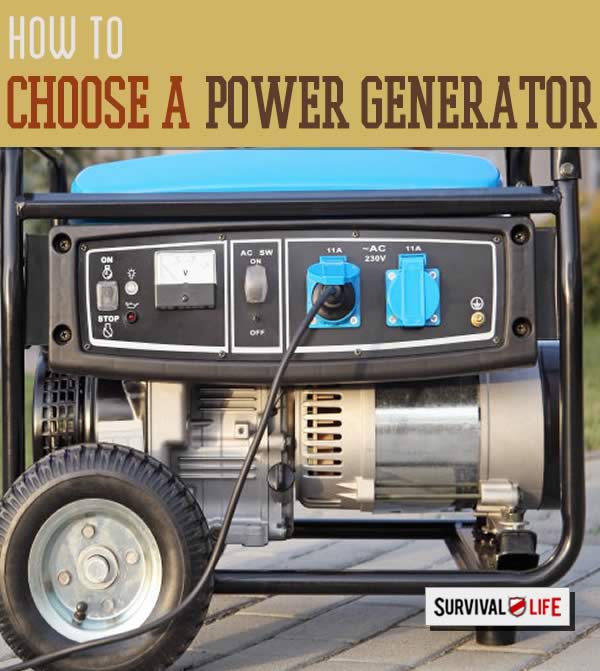Alternative Energy
Choosing a Power Generator

Choosing a power generator is one of the most important decisions a prepper will make. Your generator is one of the first things you will turn to when SHTF.
When choosing a generator, there are a lot of things to consider. Decisions like these can be overwhelming.
Our friends at Survivopedia have put together the ultimate guide to choosing the perfect generator for you. Check out the article below, and read find more information on their site by clicking here.
How to Pick the Perfect Power Generator
Electrical power is a part of our day-to-day lives. While it is possible to live without that electrical power, many things that we use would no longer be available to us. Considering how fragile the electrical grid is and that it only takes a medium-sized storm to start knocking down power lines, it only makes sense to have some sort of power generator for your home.
When most people think of a power generator, they think of a gas operated one. Gas operated generators are relatively inexpensive to buy, but extremely expensive to operate. For any long-term emergency situation, gas operated generators just aren’t practical.
- Dual Fuel – Operate your 7500-watt portable generator right out of the box on either gasoline or...
- Electric start – Power up the 439cc Champion engine with the handy toggle switch, battery included
- Intelligauge – Keep track of voltage, hertz and run-time hours to easily monitor power output and...
The other problem with gas operated generators is that they are noisy. If you want to maintain OPSEC and not let people know that you are prepared to deal with the emergency, then the last thing you want to be using is a gas operated generator. The noise alone will give you away and attract much unwanted attention.
That’s part of the beauty of solar power. Of all the power options available for use in an emergency, solar power is the best. The one drawback to it is that solar panels are expensive. However, once purchased, there are no operating expenses and solar panels will work for up to 20 years, with minimal power loss. For long-term power generation, solar is the best emergency backup system you can go with.
For solar to become a complete backup solution, you need more than just a solar panel. The solar panel absorbs sunlight and converts it to electricity. Typically, solar panels put out about 18 volts DC, which makes them perfect for charging 12 volt batteries. The slight over voltage of the solar panel means that it will still charge the battery, even if clouds are preventing the solar panel from operating at 100% efficiency.
The 12 volt DC of the battery can either be used as it is, such as for plugging in cell phones and other devices to charge them, or it can be inverted up to 120 volts AC, for use in powering home electronics. Either way, the solar generator is providing necessary electrical power for meeting your needs.
Most solar power generation is done by solar panels that are mounted to a home. However, there are also portable solar generator stations, such as the PowerWhisperer. This is a fully self-contained solar power generation system, with on board battery and voltage inverter. The heavy-duty aluminum case protects the system from EMP and the generator is mounted on a cart, making it portable.
Another thing you might want to consider is having a small, flexible solar panel for your bug out bag. That would allow you to power your electronics while away from home. There are a number of options for those types of solar generators as well. While not big enough to provide electricity for your home electronics, they are big enough for charging cell phones, GPS units, tablets and portable computers that you might take with you on a bug out.
Our Recommendation
The PowerWhisperer is a mobile power system designed with prepping in mind: as a silent system, the PowerWhisperer won’t give you and your family away.
This stealthy power supply provides power for a family when the lights go out; whether due to a storm or an EMP.
Since it isn’t powered by a gasoline engine, there is no noise to alert the neighbors that you have power, while they are sitting in the dark.
The system consists of a high capacity, 100 amp hour, deep cycle lead-acid battery. The battery is charged by two 50 watt, Second generation, flexible solar panels; which are stored in a compartment in the unit. 45 foot leads are provided for the solar panels, allowing you to put them on the roof or some hidden area, without giving away the presence of your PowerWhisperer.
A 2,000 watt voltage inverter provides sufficient power to run any home appliance or power tool. You can also use the 12 volt output for powering devices that are designed for plugging in to a car’s power system, such as for recharging a phone or other portable electronics.
A power station, enclosed inside the unit, provide breakers and connections for drawing power from the unit, as well as a LED readout to tell you the status of the unit and its charge. Connection for the solar panels is provided in the storage compartment. You can also attach additional solar panels for faster regeneration of the system.
The entire unit is housed in a rugged, 1/16 inch thick aluminum case, mounted on two wheels, for movement like a hand truck. Lightweight and compact, the PowerWhisperer can be used for bugging in or if you are bugging out to a prepared bug-out retreat, it can be brought along. The aluminum case is a perfect Faraday cage, protecting the components of the system from EMP. A woodland pattern camouflage net is provided for help in concealing the unit from neighbors while in use.
A compartment for storing the solar panels is also big enough for storage of radios and other small electronic devices, keeping them with the power supply, while protecting them from EMP. Made in the USA, you can be sure about the quality of this unit.
DIY Portable Solar Generator
5 Easy Preps for Power Outages
Preparing for a Power Outage
Last update on 2024-11-22 / Affiliate links / Images from Amazon Product Advertising API
-

 Paracord Projects1 year ago
Paracord Projects1 year agoParacord Projects | 36 Cool Paracord Ideas For Your Paracord Survival Projects
-

 Paracord Projects1 year ago
Paracord Projects1 year agoHow To Make Paracord Survival Bracelets | DIY Survival Prepping
-

 Medical Care1 year ago
Medical Care1 year ago21 Home Remedies For Toothache Pain Relief
-

 Knife Laws1 year ago
Knife Laws1 year agoAre Switchblades Legal? Knife Laws By State
-

 Do It Yourself1 year ago
Do It Yourself1 year agoSurvival DIY: How To Melt Aluminum Cans For Casting















cary
January 1, 2015 at 9:40 AM
What about reviewed solar options such as Goal Zero?
ron
January 1, 2015 at 9:51 AM
Why do you take long to send out an item…it takes as long as two months to receive items ordered…it takes only minutes for you to take my money….I’ve cancel led two orders because tired of waiting….you need to do a better job of processing orders…I probably will stop ordering from you and just do thru amazon…..sorry but it the reality of doing business
Joe Davis
April 12, 2018 at 8:06 PM
That’s no bull shit they take forever. They probably don’t buy from China until they have a big enough sales from us. I won’t buy any more from them this has happened to me twice. and there ya go Survival life. The end is near and it is your fault. We tried you.
Michael Bowman
January 1, 2015 at 10:08 AM
“How to pick a perfect power generator,” seems like an ad for the solar powered generator and not much else. The article assumes that use of a gas unit would be dangers because it makes a lot of noise and expensive because it runs on gas. The purpose of these articles is to inform the reader so they can make an informed decision for what their best option would be, not make a sales pitch. I give this article an E for effort!
Gary
January 1, 2015 at 10:17 AM
You failed to mention both a propane generator and diesel generator, which maybe you just consider gas powered units. I have heard that propane units are much quieter, and diesel units don’t have the problem of the gasoline going bad like gas will, even with stable added. As a back up unit to run most the stuff in your home, the solar units don’t produce enough voltage without many more panels. Maybe you could research the options a little more to give us a more complete picture.
Big Tony
January 1, 2015 at 9:25 PM
The problem or picking the adequate source of generation whether it be a generator, gas, propane or diesel boils down to cost and where you live. If the SHTF who cares the noise a propane or generator makes, the issue is to fuel it so a 250 gallon propane tank will keep you going 25 to 50 days so when you run out then what?
Forget internet or satellite tv or cell service if you are hit and survive EMT. Forget your $50K BMW it won’t start, forget your electric hot water heater or AC unit or your toaster or microwave or your wifes hair dryer or washing machine, dryer, dishwasher.
Go buy a Vermont Castings Defiant wood stove and have plenty of trees on your property and use it to cook on, heat water and keep your house warm. The solar system to run all your stuff will cost at least $30,000 and thats on the low side.
Go buy a cabin in BFE with a stream and an out house and don’t forget the mules and buckboard so you can go into town to buy supplies if a town is not a ghost town after the air blast that caused the EMT.
If you are pissed off by then call Obama and tell him you were a fool to vote for him twice!!
Dru
January 20, 2015 at 4:04 PM
I have a propane powered generator and it is not quiet. At all.
brad
January 1, 2015 at 10:31 AM
Well all good if the sun shines.. Living off grid I call tell you getting 3 hours of sun will not charge the batteries… So yes YOu need a gas type generator to run as backup… It is total BS to think a little 1 panel solar unit will save the day… Maybe run your beer cooler for an hour or 3….
Frank Ritter
January 1, 2015 at 10:34 AM
How much does it cost and what/how many appliances can be connected to it? How many appliances can it run at one time?
BOB
January 1, 2015 at 1:46 PM
You are giving the public false-hope ,as common sense will tell you that one 12 volt battery and one 100 watt pv panel will only power one appliance depending on the watts it pulls , when you factor the inversion loss from 12 volt dc to 120 volt ac[ 20-25 %] ,it requires 160 % more panel charging to power said appliance , If you take one 100 watt light bulb and plug it into a 400 watt 12 volt to 120 volt inverter hooked to a 12volt fully charged battery , under full sun {12 noon} it requires 160 watts from a pv panel to keep the battery from dropping 1/10 volt !To power a new low draw refrig , you need a 200 watt panel and one deep cycle battery to power it for 24 hour period , opening the door only in the daytime and never after dark , the battery should never drop below 11 volts !For long life .{Have 30 years experience}.
Jim
January 1, 2015 at 5:12 PM
As I stated in my reply the original purpose of my system was to keep my boat batteries charged not to live off the grid. I can pull (limited) power for light weight temporary use, once the batteries are depleted It’s back to candles and checkers. That is all it is intended for.
Jim
January 1, 2015 at 2:32 PM
I had the batteries and that would be more than half the cost the rest was, 100 watt moncrystalline solar panel (the most efferent also the most costly by about $20 but it’s a hobby)$125
30 amp charge controller $18
2 pair of waterproof connectors $7
50 feet of wire half red half black $20
Optional inverter from Harbor Freight 400watt $25
I used half inch emt (electrical conduit) to make a rack to connect it to the boat $2 and some cutting and drilling and smashing the ends.
So as I had the batteries already it cost me about $200. All items were new purchased on ebay except the inverter.
Jim
January 1, 2015 at 2:40 PM
Sorry Frank I forgot to answer part two: I haven’t used it much as my original prepuce was to keep the batteries charged and to extend their life, but we did have the power go out here as while back and I ran an extension cord into the house to power out satellite receiver, our 40 inch tv and 3 60watt equivalent led lights. Used it for about 2 hours at night so no recharging going on. Worked.
steph
January 1, 2015 at 10:46 AM
when you are struggling to pay hospital and doctor’s bills there is no spare change for an item that costs 3,000. Might want to find something a whole lot cheaper and stop with the cronyism.
Al Roper
January 1, 2015 at 10:51 AM
I wish someone would address the power needs of those that have little or no money to spend on expensive solar outfits. Rotting garbage and grass cuttings are not an option for many people to produce methane.
I have a water well with a 1.5hp pump and electric hot water heater. I have two generators, one 4000W to run the small things and an 12,0000W to take care of the heavy stuff. I can sync the phase output of both of them and run central air. How about your solar units? Can they run all that? Can you say, not exactly. I am an electrical engineer and I can assure you that any solar system that would do that would have to have an inverter capable of at least 15KW of AC output @ 240V. The inverter is not 100% efficient so it would have to have at least 15 or 17KW input from the batteries which means the solar panels are going to have to produce at least 17KW output just to keep up. And that is assuming that the batteries are fairly new and at full efficiency.
I can cut the central air off and reduce the load by 38%. That still requires 10,540W. Not practical unless you are the government and still not practical.
Al Roper
January 1, 2015 at 11:09 AM
I made a typo when I stated the power output of the larger generator, it should read 12,000W not 12,0000W.
Sorry,,,,,,,,,,,,
Dick Wolf
January 1, 2015 at 10:53 AM
If there are electrical cables penetrating the aluminum box and connected to any electronics inside the box, the box will not provide EMP protection. Suggest you correct your ad.
Patricia L Simecak
January 1, 2015 at 10:57 AM
How much does it cost and how many things can plug in to it.
James Baur
January 1, 2015 at 11:21 AM
Thank you for this vital info. By the way, do you happen to know, offhand, how much the generator costs; where it’s available?
James Baur
January 1, 2015 at 11:24 AM
What is this “awaiting moderation” reply stuff? Please advise.
Tom Guiod
January 1, 2015 at 11:23 AM
A better option is the same mobile power system using Lithium-ion batteries if such a thing exists. Lead-acid batteries are dangerous if not ventilated properly and they will die if not constantly under charge. The 2kw (2000 watts) output @ 120 volts would power several small appliances or one large one. Just Google “electrical appliances power requirements” or go here: http://www.wholesalesolar.com/StartHere/HowtoSaveEnergy/PowerTable.html. The article doesn’t mention if several of these units could be connected inline to double or even triple the power. Additionally, sound isn’t the only concern for detection. If you use the generator for lighting you’ll have to devise a “blackout system” for night time use.
Gary Rogers
January 1, 2015 at 12:15 PM
Ok if you don’t have power most likely the grid is down where are you going to get gas?Storing gas is dangerous in any populated area.
billy cool
January 1, 2015 at 12:27 PM
these units rely solely on the battery to run loads.solar panels will recharge the battery within a 5 to 6 hour time frame per day.[optimally]. for a long term power outage you dont really want to discharge your battery more than 50%or you shorten the life of the battery significantly.100 amp battery is good for 500 watts before discharging beyond that 50% point.100 watt solar panel could provide 500 to 600 watts to recharge the battery in 5-6 hours of good sunlight.so,a 50 watt load would work for about 10 hours.look at your appliance label to see what it uses in an hour.
Patricia A Martin
January 1, 2015 at 1:07 PM
Ok, what does this unit cost and who sells it? Will it keep my refrigerator going and at the same time allow me to use a radio, TV, and my computer and or IPAD?
joe
January 1, 2015 at 5:58 PM
Lee Bellinger of AMerican Lantern sells it….it won’t do a fridge, but it will do a freezer, radio, tv, computer and some lights. I know…I own one.
Jim
January 1, 2015 at 2:01 PM
I built my own solar system: One bass boat, 2 deep cycle batteries that are for powering the trolling motor, one 100watt solar panel attached to the trailer and is removable if I decide to go fishing, one charge controller. So now I have a mobile solar system that also keeps my batteries in the boat at full charge and ready to go. Life doesn’t get any better.
Guy
January 1, 2015 at 2:06 PM
Shame on you ! I clicked the link to this page because you made it sound like you had done a study of the pros and cons of different generators, but instead it is nothing but a ad for a VERY expensive and UNDER powered solar system.. Survival Life, You disappoint me !
joe
January 1, 2015 at 5:57 PM
I actually have a Power Whisperer; i bought it from Lee BEllinger’s outfit in SC. Now I’m not an engineer, I’m a slightly gullible prepper from 1999. I’ve settled down a bit but still believe there’s trouble coming. Years ago I bought a 6000 watt diesel generator, which I’ve used maybe 3 times. I figure if the SHTF you can have the best set up on earth but where you gonna buy your propane? Your gas? But every house in the region has home heating oil; if there is chaos there’ll be abanoned trucks and earth moving equipmente and industry that’ll have diesel. I can load up my home heating oil and have a few hundred gallons available. But it is LOUD, and for minor stuff I wanted a quiet alternative. Please folks, don’t go down the road that this Power Whisperer won’t power your entire house. Of course it won’t. In a crisis you’re gonna want maybe a freezer – NOT A FRIDGE – the seller makes that clear – something to charge batteries, maybe run some lights, radio, maybe keep one room electronic. And it works. ON Thanksgiving here in New England we had a power outage for 5 hours and I pulled this out (I keep it charged monthly using a trickle charger (included)), and plugged in my stove (which has electronic ignititon), my cell phone and a lamp. Worked FINE. Was it a good deal? You tell me. It was a couple grand. Can you put something simple together like the commenters say? I’ll bet you can, if you are pretty handy. I’m not. It’s easy to use, easy to charge. I have one, and only one problem (and question) and that is that it says the life of the battery is a couple years. What good is that if the SHTF in 4 years? Will it last then but only have a 2 year life if I use it regularly or will it be useless after 2 years? What good will it be if I need a new one and Batteries R US is long gone? So that is my only issue but if the world craps the bed and my family has to huddle in one room, burning wood for heat, and distilling H2o from seawater, and just want enough electricity to run a few lights at night and maybe keep our freezer (which I don’t even own, btw) stash of venison frozen, it’ll do the job. Unlike a lot of nay-sayers, I own one. Was I suckered? Maybe. On Thanksgiving my neighbors didn’t think so.
Anita Paul
January 1, 2015 at 6:08 PM
I purchased a Generac whole house system that runs on natural gas. It is connected to the gas line at the street in front of my house. I hope I didn’t make a big mistake with this purchase, as it wasn’t cheap. But, I have a child dependent on a ventilator and tube feeding pump.
BC
January 1, 2015 at 9:15 PM
diesel will eventually turn to black sludge, gas will lose it’s octane content, and solar is a “LIGHT DUTY” backup for a real generator!
either a bi-fuel or tri-fuel carburetor generator would be ideal, especially having one of the fuels being propane. propane is way less efficient, but it stores indefinitely, and it burns with less wear and tear on the motor’s internals.
as for sound management, putting the gennie into a well insulated closet, small shed, or underground using whatever is available: foam insulation, batting, blankets, clothing, etc, etc will make it quieten down a good bit. the icing on the cake for noise reduction, is to run about 25 to 75 feet of pvc underground, connected to the generator by 25 feet of threaded, steel pipe. this allows cool down before it gets to the pvc. if you don’t have enough room to run that long of a straight run, loops and/or coils can be created with elbows, or switch to poly-pipe. from beginning to end, length is critical to sound dissipation!
3-inch septic, exhaust pipe can be used for air intake by running the pipe through the ceiling of the insulated room and out into the attic, or out through the roof.
CAUTION: if the generator is put into a closet, all propane connections need to be inspected and re-inspected, probaby every 6-12 hours. Propane is HIGHLY explosive! i would make sure and put CO detectors, inside and outside of the immediate area also. an exhaust leak is as deadly as the gas. although not explosive, it is a silent, deadly killer. A CLOSET WOULD BE A LAST RESORT IF YOU DO NOT HAVE A FENCED BACKYARD OR A SECURE SHED!
Big Tony
January 1, 2015 at 9:36 PM
Iforgot, go buy a Winchester 30-30 model 94 and a couple of thousand rounds of ammunition, a Glock 23 40 S&W for yourself and a 9mm for the wife and kids and a good crossbow for hunting and forget organic foods or vegaterian diets you will be eating what you kill and what you gro
spockmckoy
January 1, 2015 at 10:09 PM
All I can say about this is: you have 2 @ 50 watt solar panels capable of max 2.7 amps each at max sun, you have 1 deep cycle, 100 amp hour battery. you will have great difficulty recharging this battery from these panels in a reasonable amount of days of sun….even IF you don’t use the battery every day.
Walter Diem
January 1, 2015 at 10:20 PM
Why are there no U.S. made solar generators that utilize lithium batteries? Lithium batteries are so superior to lead/acid batteries for this type of application that system conversion over to lithium by the manufacturers of this equipment should be a “No Brainer”!!!!
Kelly smith
January 2, 2015 at 12:24 AM
If the goal of this site is to just send us to affiliate links, then I am gone. If the goal is to have us trust you to provide reliable information that we can use, then please quit writing articles like this that only do one thing: point us to an affiliate link.
Steve currey
January 2, 2015 at 7:01 AM
Besides the fact this is nothing but an advertisement, there is not even good information. And the unit is very inefficient and over priced. A 12 volt solar system is the least efficient solar system that you can have. 24 volt is much better and 48 volt is far superior to a 12 volt. If the $3000 price that someone mentioned in the comments is correct, a much better system could be built with a little research and a few handyman skills. And unless you build a much better system, you better have some type of s backup generator. Even if you do have a really good solar system you should have a back up generator. Especially if you are going to live off the grid. And there was no mention of a hydro electric system at all. That would be by far the best system if you have moving water on your property.
EVELYN ZUNDEL
January 3, 2015 at 5:54 PM
How much does it cost for the generator ? I am a poor girl ,what about a gas generator with solar power would it work also ?
Mark Greer
January 10, 2015 at 1:46 PM
I ordered the survival radio last Black Friday,as it was priced at about $14 less than from the manufacturer’s site. But after over 30-days, and the order got lost – I ended up cancelling my order. I got a full refund, but I wasn’t impressed with the ordering process. Also,I really wanted the radio, and will still likely purchase it in the near future – just not from Survival Life. Sorry.
stop2
May 26, 2015 at 1:30 AM
The Honda 2000i is a fantastic little device that will put out 2000 Watts of clean power for 8 hours on 1 gallon of gas!
http://www.dfcmechanical.com
mickleclarck
June 10, 2015 at 2:59 PM
All of, the Honda portable generator is the best one I think. You describe excellently how to choose a portable generator. You have done really a great job. Thanks for sharing such a informative and helpful post. You may visit my page that as like you at generator for sale .
BC
June 12, 2015 at 4:51 PM
a gas engine can be muffled and quietened significantly with long enough length of pipe. if one couples it with a 4-wheeler muffler or small car muffler, it’s evn better.
connect lengthy amount of pipe to the existing muffler, bury the length underground, and voila, u have reduced the sound output!
as for sizing, take the number of watts of output divide by the number of constant voltage you need and it equal your amperage. example: 7500 watt unit/120 volts = 62.5 possible amps to run your breakers. 62.5 amps/15 amp breakers = 4 breakers (minus a 15% load discrepancy,)……3 breakers
Dwight Stoller
July 18, 2015 at 3:29 AM
My mother passed away and we found a brand new Powerwhisper M-Type in her basement. Never out of the box. I’d like to get $1,500 for this unit. I see it retailing for anywhere between $2100 and $3000 online currently.
Florineta
July 23, 2015 at 5:24 PM
Where do you live? Do u have a picture?
Florineta
July 23, 2015 at 5:27 PM
Email pic
Florineta@yahoo
Viko
July 18, 2015 at 9:44 AM
Useful information, thank you!
http://pickmysolargenerator.com/
John Anderson
July 24, 2015 at 7:30 AM
The article you describe above is really informative and helpful. Thanks for the post.
generator review page
John Anderson
July 25, 2015 at 7:48 AM
Great! To chose a power generator your tips are really helpful.The Honda 2000i is a fantastic little device that will put out 2000 Watts of clean power for 8 hours on 1 gallon of gas! I also find out another page as like your Portable Generator Reviews
Alex
July 30, 2015 at 4:22 AM
I agree with what others have said the Honda 2000i is a solid little machine with enough output to survive an emergency. Yamaha makes a 2000 and a 2200 that is awesome as well, the only downside to all three is the price, they sure arent cheap. Thanks for recommending the power whisperer, as Id never heard of it before.
Pingback: Electrical Backup for a Refrigerator-Freezer | SL
Pingback: Things You Need to Live Off the Grid | Survival Life
Pingback: 9 Things You Need to Live Off the Grid - Survive!
lamont schusse
April 12, 2018 at 10:37 PM
I’m another dissatisfied customer. Does take forever to get an order, plus I have ordered the shovel & tomahawk twice and I never get any notification that the order is on “back order” ! If I had know that I would not have given you my money. So you take my money and do what with it ? Bank it and get the interest into your account ! I am going to report you to the Better Business Bureau. I don’t care if you’ll charge back my account, I think you are pulling a scam.
Pingback: Power Outage: What To Do When The Power Goes Out
Pingback: Power Outage: What To Do When The Power Goes Out – Ultimate Survival Alerts
Pingback: 9 Things You Need To Live Off The Grid – Ultimate Survival Alerts
Pingback: Solar Power | Measuring the Power Solar Cells Produce | Survival Life
Pingback: Solar Power for Homes| Electricity from the Sun's Energy | Survival Life
Pingback: DIY Solar Power – Part 1 – Ultimate Survival Alerts
Pingback: Off-Grid Solar Survival: Top 5 Things to Consider Before Diving In
Pingback: Off-Grid Solar Survival: Top 5 Things To Consider Before Diving In | Primitive technology
Pingback: Off-Grid Solar Survival: Top 5 Things To Consider Before Diving In – Ultimate Survival Alerts
Pingback: Off-Grid Solar Survival: Top 5 Things To Consider Before Diving In - Survival Patch